#obsolete kana
Explore tagged Tumblr posts
Text
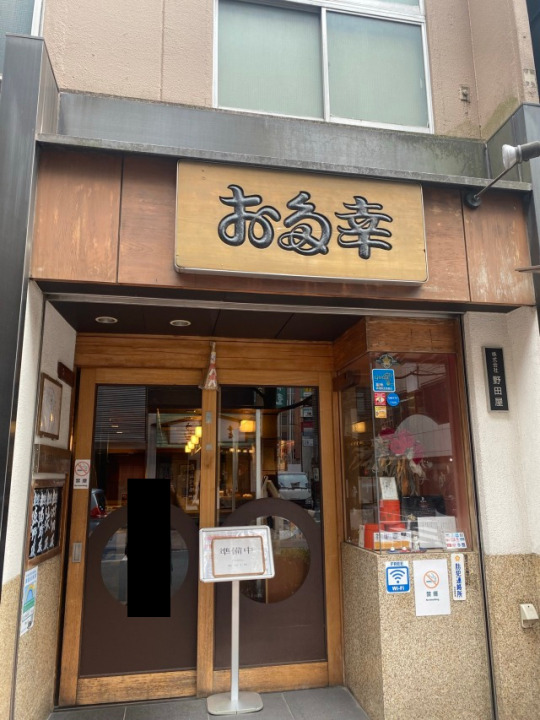
Oh wow, I found a fantastic obsolete kana the other day! I guessed several different things I thought it might be but kept coming up wrong! Have a think about what it is (maybe have a little look through my obsolete kana tag if you like), and then click through to find out if you were right!
Because character input doesn't support the kana, the restaurant lists itself as お多幸, read Otakō. That's right, this is an obsolete た! That really surprised me......
I suppose I can feel the similarities in stroke order/writing motion, but still, wow! I really need to learn more kuzushiji. (I got an app, but I keep not doing it.) Anyway!
多 means many, much, or frequent. It's read おお.い, まさ.に, まさ.る, or タ. It happens to be the source of katakana タ, whereas hiragana た comes from 太.
幸 is new to this blog! It means happiness, blessing, or fortune. It can be read さいわ.い, さち, しあわ.せ, or コウ.
Finally, if you take the honorific お off お多幸, you do get a surname: Takō! Which belongs to about 10 people nationwide, making it Japan's 90,180th most common surname.
#edited in the awkward black rectangle#after realizing my full reflection and face were visible!#learning japanese#kanji#japanese langblr#japanese calligraphy#obsolete kana#多#幸
88 notes
·
View notes
Note
How would you approach languages like Mandarin or Japanese, where the base components of its phonology are syllables already? Like Kana in Japanese or Pinyin in Chinese. Will you only take out the syllables that only have a vowel component or are those languages obsolete in your system?
Hw wld y apprch lnggs lk Mndrn r Jpns, whr th bs cmpnnts f ts phnlg r sllbls lrd? Lk Kn n Jpns r Pnyn n Chns. Wll y nl tk t th sllbls tht nl hv vel cmpnnt r r ths lnggs bslt n yr sstm?
Considering I know neither of those languages, I feel it would be irresponsible for me to attempt to disemvowel them, especially since their rules are so different from English, so I'm not gonna touch that.
11 notes
·
View notes
Text
reading demon slayer: chapter 10 name breakdown
we enter the double digits in demon slayer chapters with just 3 simple names. let's jump right in.
the first new name we're given is
和巳
read as かずみ. this is the name of the poor young man who tanjirou meets in the beginning of the chapter. if you are already somewhat familiar with japanese names, this one might sound a bit feminine to you. in actuality, it is gender neutral, but depending on how it is written it may come off as more feminine or more masculine. women with the name かずみ tend to write it with the character 美 (read as み), which is a very common kanji for feminine names.
the way かずみ is written in chapter 10 is, in my opinion, a little more masculine. the first character, 和 (read as かず), means peace. the second character, 巳 (み), represents the sixth sign of the chinese zodiac--the snake. 和巳 is then literally peace snake. less literally you could interpret it as meaning peaceful snake.
as you might recall from chapter 8's name breakdown, the chinese zodiac is related to a broader calendar system that is in turn related to traditional chinese philosophical concepts such as yin and yang, the five elements, and the cardinal directions. the zodiac signs themselves are no exception. though the followings meanings are obsolete, i thought they were worth knowing.
in the past, 巳 also referred to the hour of the snake, which could mean either 10 AM or the two hour period from 9-11 AM. the fourth month of the lunar calendar was called 巳月, or snake month. and it was used to refer to the compass direction of south-southeast as well. again, if you have any interest in chinese astrology or philosophy, please go read up on it. it's fascinating and i don't have nearly the knowledge to adequately explain it.
the next name is
里子
read as さとこ. this is the name of kazumi's girlfriend, who was taken by a demon prior to tanjirou's arrival in town. like 美, the character 子 (こ) is a very common kanji used in feminine names. it means child. 里 (さと) means village, countryside, hometown. together we get village child. perhaps she was fond of her home, or maybe her parents wanted her to be.
the last name is
トキエ
and if you can't read katakana, now is a great time to start learning. this is the name of the girl who gets taken in chapter 10. we only learn her name from gotouge in the taishou secret gossip section. it is not written in kanji, which is actually fairly common. using only kana is a typically feminine and trendy thing to do. it also means that there is no deeper meaning to the name; it is just a series of sounds.
that brings us to the end of another name breakdown. thanks for reading, and please look forward to the next posts! 読んでくれてありがとう!次の投稿を楽しみにしてください!
1 note
·
View note
Text
Hey! I initially only wanted to mention that 決 [kechi/ketsu/ki] is probably the intended kanji, as it means "decide, judge, determine": see 決意 [KETSUi] determination, resolution. It is also part of 決行 [kekkou] execution!
I want to note some other kanji I noticed while checking my sources:
apparently 穴 [ana], meaning "hole", can be read as [ketsu]
so can 欠/缺 [ken], meaning "lack/gap/fail". The second kanji listed under [ken] is a mostly obsolete version of the first but, with a spirit of true Lingustical Lawbreakers, both feature in ten word 欠缺 [kenkatsu], meaning "lack" or "deficiency".
ketsu as in "gay sex" or "butt" is written in kana and is therefore not a name component
Moreover, the intended "kane" here is probably not 金 (money), but 鐘 (bell), as it IS more topically appropriate, at least to Ceroba. Making the surname mean something along the lines of "the judgment bell" or "the execution bell"! Neat.
my immersion in undertale yellow has been completely ruined by the surname "ketsukane". the only two translations for "ketsu" I know are "butthole" and "gay sex", and while 金 is a perfectly viable kanji to have in your name, "gay sex money" is not a reasonable surname in any capacity
199 notes
·
View notes
Text
The kanji in AC characters' names
It feels like my life’s nothing but endless procrastination… This time, I started going through the kanji in the AC characters names, just… because? It’s not like I actually lacked stuff to do. But as I now did this, might as well share…
One general note: the names don’t necessarily ‘mean’ anything, even if the kanji they’re composed of do. They’re just names. Often the kanji are read quite differently in names than they would be otherwise. Some kanji might also have several, very different meanings. Akabane 赤羽 Karma 業 赤 red 羽 feather 業 karma, fate, destiny; uncontrollable temper (normally read ‘gou’)
Isogai 磯貝 Yuuma 悠馬 磯 seashore 貝 shellfish 悠 quiet, calm, composed; distant, endless, eternal 馬 horse
Okajima 岡島 Taiga 大河 岡 hill 島 island 大 large 河 river
Okano 岡野 Hinata ひなた 岡 hill 野 field Hinata is written in kana, but it means sunny place, in the sun
Okuda 奥田 Manami 真奈美 奥 inside, interior 田 rice field 真 truth, reality, genuineness 奈 obsolete meaning: apple tree (current meaning is apparently ‘what?’ I’m going with apple tree here) 美 beauty
Kataoka 片岡 Meg メグ 片 one-sided, sheet; incomplete, imperfect 岡 hill Megu doesn’t mean anything.
Kayano 茅野 Kaede カエデ 茅 grass/sedge used for thatching 野 field Kaede is written in kana, but it means ‘maple’
Yukimura 雪村 Akari あかり 雪 snow 村 village Akari is written in kana but it means ‘light’ Aguri’s name is written with kana too, but there are a bit too many options for which kanji to use for it to give any guesses. (agurii in kana is a loanword from English, tho, and means agreement. This amuses me a little, cause Aguri sure is a bit too agreeable at times…)
Kanzaki 神崎 Yukiko 有希子 神 gods, mind, soul 崎 cape (on coast) 有 possess, have, exist 希 hope; rare, phenomenal 子 child
Kimura 木村 Masayoshi 正義 木 tree 村 village 正義 justice, normally read ’seigi’ or ‘Masayoshi’ if a name. However, what Kimura’s parents call him is the English word “Justice” – or Jastisu, or something like that, as the word gets a bit twisted in Japanese. I noticed the wiki claims they call him Seigi, but that’s wrong. You can hear people clearly saying Justice here: https://youtu.be/yoAYw4ksoa8?t=714 and later again at 17:37 in that video. Also, in the final roll call, Korosensei calls him Kimura Justice-kun.
Kurahashi 倉橋 Hinano 陽菜乃 倉 warehouse 橋 bridge 陽 sunshine 菜 greens, vegetables 乃 possessive particle
Shiota 潮田 Nagisa 渚 潮 tide, salt water; opportunity 田 rice field 渚 water’s edge (His mother Hiromi 広海 : vast/wide & sea)
Sugaya 菅谷 Sousuke 創介 菅 sedge 谷 valley 創 genesis, originate; wound, injury 介 shellfish
Sugino 杉野 Tomohito 友人 杉 cedar 野 field 友 friend 人 human, person
Takebayashi 竹林 Koutarou 孝太郎 竹 bamboo 林 small forest 孝 filial piety 太 grand, magnificent 郎 son
Chiba 千葉 Ryuunosuke 龍之介 千 thousand 葉 leaf 龍 dragon 之 this (one); possessive 介 shellfish
Terasaka 寺坂 Ryouma 竜馬 寺 temple 坂 slope, hill 竜馬 these kanji literally mean “splendid horse” but then the word would be read ryuuma, not ryouma.
Nakamura 中村 Rio 莉桜 中 middle 村 village 莉 jasmine 桜 cherry
Hazama 狭間 Kirara 綺羅々 狭間 The kanji of Hazama are “narrow” and “space”. The word itself (Hazama) means such things as interval, ravine, crenel, eyelet. 綺 thin twilled silk fabric 羅 lightweight fabric or clothing; silk gauze; thin silk 々 repeats the previous kanji (kirakira means glittering, sparkling, twinkling)
Hayami 速水 Rinka 凛香 速 fast 水 water 凛 cold, dignified 香 fragrance, scent
Hara 原 Sumire 寿美鈴 原 meadow, plain 寿 longevity 美 beauty 鈴 small bell (I guess it isn’t a coincidence that hara, written with different kanji, also means stomach. I almost left that out cause I feel it’s a little stupid, but whatever.)
Fuwa 不破 Yuzuki 優月 不 non- 破 break, rip, destroy 優 excellent, gentle, graceful 月 moon
Maehara 前原 Hiroto 陽斗 前 front, ahead 原 meadow, plain 陽 sunshine 斗 Big Dipper, sake dipper
Mimura 三村 Kouki 航輝 三 three 村 village 航 navigate, sail, fly 輝 radiance, shine, gleam
Muramatsu 村松 Takuya 拓哉 村 village 松 pine 拓 clear (the land) 哉 question/exclamation mark
Yada 矢田 Touka 桃花 矢 arrow 田 rice field 桃 peach 花 flower
Yoshida 吉田 Taisei 大成 吉 good fortune, joy 田 rice field 大 big, large 成 (to) become
Ritsu 律 Okay, we all know it’s short of Autonomously Intelligent Fixed Artillery (自律思考固定砲台 Jiritsu Shikou Kotei Houdai). The Ritsu part of all that means law, regulation. (Jiritsu is sort of a philosophical concept of autonomy, or self-control. It’s literally something like “self regulation”.)
Horibe 堀部 Itona 糸成 堀 moat, canal 部 section, department 糸 thread 成 (to) become
One interesting piece of trivia: the names of the students are based on the names of the 47 ronin, which is a rather famous story in Japan about a group of ronin (masterless samurai) who in the 17th century avenged the death of their master. It is rather interesting, though, that the master they were avenging was called Asano… the exact same kanji too, in that case.
Most of the names are pronounced exactly the same, except the kanji might be different. Here’s a list of all the students and the corresponding samurai. (I know I saw a post about this the delved even further into it, but I can’t find that post anymore. I’m sure I reblogged it, too.)
·
Asano 浅野 Gakuhou 學峯 浅 shallow, superficial 野 field 學 learning, knowledge 峯 peak, summit; back of the blade
Asano 浅野 Gakushuu 学秀 学 basically the same kanji as in his father’s name, just simplified 秀preeminence, supremacy, excellence (note: gakushuu written as 学習 means study)
Sakakibara 榊原 Ren 蓮 榊 sakaki (species of evergreen sacred to Shinto) 原 meadow, plain 蓮 lotus
Araki 荒木 Teppei 鉄平 荒木 logs in bark, unseasoned timber 鉄 iron 平 peace; flat
Koyama 小山 Natsuhiko 夏彦 小 small 山 mountain (i.e. hill) 夏 summer 彦 boy, lad
Seo 瀬尾 Tomoya 智也 瀬 rapids, shallows 尾 tail; lower slope of mountain 智 wisdom 也 to be
Tsuchiya 土屋 Kaho 果穂 土 soil, earth 屋 shop, roof, house 果 fruit; achieve 穂 ear (of a cereal plant), point (of a brush, spear, etc.); crest (of a wave)
·
Karasuma 烏間 Tadaomi 惟臣 烏 crow, raven 間 interval, between (incidentally, written with different kanji, his last name would be “crow demon”) 惟 this (one) 臣 retainer, subject
All of Karasuma’s subordinates have birds in their names. We have
Tsuruta 鶴田 (crane - rice field) Hirokazu 博和 (esteem - harmony)
Ukai 鵜飼 (cormorant - raise/domesticate) Ken’ichi 健一 (healthy - number one)
Sonokawa 園川(park/garden; river) Suzume 雀 (sparrow)
And then there’s his boss, Onaga 尾長 Gouki 剛毅. Onaga is azure-winged magpie, gouki fortitude/firmness of character/manliness Onaga’s daughter, btw, the fake Ritsu, is Nise 仁瀨 (benevolence - swift currents). But, with different kanji, nise can also mean imitation or fake.
Oh, let’s throw him here too, I guess
Yanagisawa 柳沢 Kotarou 誇太郎 柳 willow 沢 mountain stream, swamp 誇 boast, pride 太 grand, magnificent 郎 son
(Almost the same given name as Takebayashi’s, but for Yanagisawa the first o is short. Also, the meaning of the kanji is very different, for Takebayashi it’s filial duty, for Yanagisawa, pride.)
There. Let me know if I’ve forgotten anyone!
60 notes
·
View notes
Text
one touhou factiod i find neat is two characters, Tewi Inaba and Tenshi Hinanawi, use the kana “ゐ” for the “wi” sound in their names (the w is silent). that kana is nearly obsolete in modern japanese, giving the implication that Tewi and Tenshi are Really Really Old.
3 notes
·
View notes
Text
Yonaguni Kanji for dummies
・The basics - Kanji used in Luchu (Ryukyu)
1) Kanji (漢字) are logographic Chinese characters that are used in the Japanese and Luchuan (Ryukyuan) writing system.
2) Shuri Uchinaaguchi (Okinawan), the official language of the Luchu Kingdom (Ryukyu Kingdom), was historically written in hiragana-kanji mix.
3) Luchuan languages are often labelled as dialects, and because of this kana-kanji mix used in Luchuan languages has become obsolete.
・Yonaguni kanji (Dunan kanji)
1) Similar to both Japanese and Uchinaaguchi (Okinawan), it is possible to write Yonaguni using mixture of kanji and kana.
2) Currently there is no standardized Yonaguni orthography, and the modern Yonaguni writing system typically uses only Japanese Kana.
3) The book 與那國島圖誌 published in 1926 provides the earliest written account of Yonaguni Kanji.

• There are three types of Kanji reading existing in Yonaguni:
1) 音読み (on’yomi) - Sino-Japanese words pronounced using Yonaguni phonology. These words are associated with Chinese sounds and meanings.
道理(どぅり), related to 道理 (dàolǐ)in Chinese.
異国 (いくく), related to 異國 (yìguó)in Chinese.
2) 訓読み (kun’yomi) - The native reading of Yonaguni vocabulary with borrowed Kanji from Modern Japanese that represent their meanings. These are not cognates with any modern Japanese words.
一緒(まどぅん)
3) 琉訓 (ryu’kun) - Words that are cognates with Japanese. These words are also a type of kun’yomi because they are pronounced using Yonaguni phonology while they use borrowed Han characters to represent their meanings.
生ち虫(いちむし), related to いき and むし in Japanese.
町屋(みしや), related to まちや in Japanese
大和(だまとぅ), related to やまと in Japanese.
*It must be noted that since Yonaguni has no standardized writing system, sometimes a word may be written in more than one way. For example, 生ち虫 can be written as 動物 while they are both pronounced as いちむし. The latter one is, obviously, kun’yomi reading.
・Example
腹病どぅきりゃ医者ぬ家んき行てぃてぃ来たよ。
( ばただみどぅきりゃいさぬやんきいてぃてぃくたよ。 )
#与那国語#与那国方言#与那国#琉球語#琉球語の方言#どぅなん#どぅなんむぬい#沖縄#琉球#Yoanguni#Yonaguni language#Dunan#Dunan language#Dunanmunui#Dunan-munui#Ryukyu#Luchu#okinawa#Uchinaa#langblr#kanji#Japan
30 notes
·
View notes
Note
Yeah Chiaki was trying to arrange the funeral with Etsu and she said that Kana dying was probably best case scenario due to her injuries, and Chiaki LOST it. She also had a major fight with Mikan as a result of it, she’s not taking Kana’s death well at all.
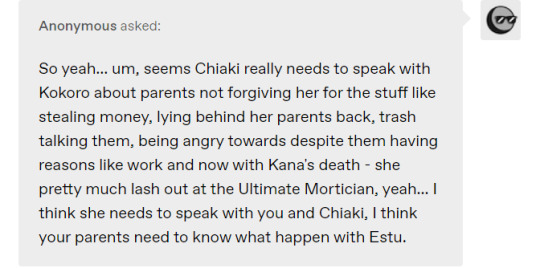




Yeah...that’s what happened just today.

I see.

I’m sorry, Nanami-san.

No...it was my fault. Unquestionably.

This isn’t just a fight me and Mikan had, it’s not just what happened to Kana, it’s...a lot of things. And all of them have to do with my parents.

How so? Could you start at the beginning?

Yeah. Well...

…For a long time, I was mad at them. I was mad that they devoted so much time to their work and not to me, even when they said they would.

See, my parents, they both went to Hope’s Peak years ago, and...well, you know how well-off people are when that happens, right?

Of course. That’s how I was able to fund much of my research.

I always thought that, because of that, they’d have everything they’d ever need. So our family would always have money, and that means we’d be set for whatever we needed. So...they wouldn’t have to work so much.

But, Mom and Dad were always off doing things, and I was always by myself.

Nanami-san, you were born in 1995, correct?

Yeah? Why?

You may have heard, but the 1990′s marked the start of a difficult time for this country. It was when the economic bubble had burst, leading to stagnation, a drop in GDP and real wages falling around 5%.

It’s something we’ve yet to recover from, especially with the 2008 recession and last year’s earthquake.

The notion that anyone who graduates from Hope’s Peak is guaranteed success for life is, simply put, an obsolete idea. I graduated the year that the bubble burst, I witnessed it happen firsthand.

Nobody, Ultimates or Commons, were unfazed by it. Your parents likely had to put in much more work than they once did in order to support you.

I...I never knew that.

I talked with them a couple weeks ago, and Dad said we really don’t have that much money...and they still want to pay for Kana-chan’s funeral, cuz her Mom doesn’t have enough.

…I stole from them for...some of our operations. Not everything, and I sold a lot of my games for the money too, but...still.

I see. But you intend on repaying them?

Of course!

It isn’t just about the money though, it’s about more than that...

Why am I still angry...? They all make a lot of sense, and I get why everything with them happened, but...I still feel this...I’m still angry at them too.

…Nanami-san? If I recall correctly, you said that you had no friends before you came to this school.

…No. I didn’t.

I tried sometimes, but...people were always mean to me, or they avoided me because I couldn’t talk normally or look them in the eye, or I could only ever talk about video games. So...eventually I just stopped trying. Didn’t matter anyway, since we’d never see each other again after we graduated.

Class 77-B, the Quantum Crew...they’re the first time I ever felt like I had someone other than my family.

They were always working, but it sounds like you value their company.

Yeah...I always loved playing games with my Dad, and they always listened to me when I talked about games. They didn’t think it was boring or annoying or weird.

Those moments didn’t last too long, but...I still cherish them. And I wanted more of them.

…And that may be why you gravitated toward Ise Kana.

Huh...? But...I never met her before then.

No, but perhaps, when you did, you believed that she could fill that void you feel your parents left from always having to work?

She was around your age, you both had common interests and, when you managed to turn her away from Storm, you two worked together exceptionally well.

Yeah. We really did, huh?

But...she’s gone.

And my parents...they’ve wanted to talk to me, but I’ve spent weeks pushing them away. I don’t even know why...

Maybe cuz all the bad stuff was all you could think about?

Huh?

I was there too. Remember, when you and the others came to get me, and you told me about why you were there?

I said a lot of stuff I...still feel bad about. I was mad. All I could think about was how much pain she’d caused me, how selfish and awful she was, and now she wanted to apologize?

But I was still willing to give it all a chance...that maybe, somehow...I still don’t really know, but I felt like I’d regret it forever if I didn’t at least give it a chance.

I certainly understand why.

But it’s not the same thing. My parents weren’t awful to me! They were never around, but only because they wanted to make sure I had a happy life!

They gave me all the games I asked for...and my Dad always played them with me whenever he could...

They were doing all this for me...and I couldn’t see any of it. I never thought about it, never asked about it...yeah, it was hard, but I could’ve asked! I could’ve done something! Instead, I just...acted like a stupid, selfish brat...

…And now...I’ve messed it all up...th-they’re never gonna forgive me for this. Nobody is... And they shouldn’t! I was so mad that I attacked Deguchi-senpai!

They...They all deserve someone better than me...

It…It should’ve been Kana-chan! I should’ve died on that island! I didn’t deserve to come back! I don’t deserve any of-!
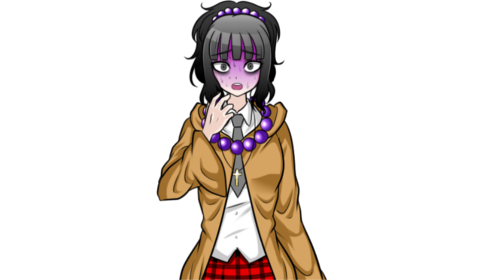
Whoa, whoa, calm down!

Nanami-san, please, take a breath...

Yeah, don’t say things like that. Sure, people might be mad, but they’re happy you’re alive.

Yeah...*sniff*...I-I’m sorry, I know I shouldn’t talk like that. Th-That’s how...all this happened...

It just feels like...everything’s falling apart and I don’t know how to fix it...
#danganronpa#sdr2#Super Danganronpa 2#sdra2#Super Daganronpa Another 2#dra#danganronpa another#Chiaki Nanami#mikako kurokawa#kokoro mitsume#a student out of time#DR#The Clouds Pass arc
13 notes
·
View notes
Text
Cherry Magic EP11 Subbed Notes
Cherry Maho EP11 Subbing Notes – 18/12/20 10:15AM -19/12/20 6:40AM
Most featured word of the episode goes to:
お つ 落ち着ける - to be quiet; to calm down; to compose oneself; to settle down
あ とき 彼の時 – At that moment, time, hour. つた 伝える - to convey; to report; to transmit; to communicate; to tell; to impart; to propagate; to teach; to bequeath ま お待たせしました - thank you for waiting; sorry to have kept you waiting Note: You would often hear wait staffs express these words once your meal arrives at your table. 待 - wait, depend on ま.つ、 -ま.ち たし 確かに – Surely, Certainly, undoubtedly 慥かに 【たしかに】
もんだい 問題 - trouble; problem; inconvenience; difficulty (Given context for the drama) 否 – Well, er, why 「どう (おも) 思う?」「いや,(さんせい) 賛成だ」 "What do you think?" "Well, I'm for it." Other forms 否 【いいや】、否 【いえ】、否 【いな】、否 【いや】 たいせつ 大切 - Na-adjective, Noun 1. important; necessary; indispensable 2. beloved; precious; dear; cherished; valuable Other forms 大切 【��いせち】 たいせち: Out-dated or obsolete kana usage. し し 知らず知らず - unconsciously; unwittingly; unawares Other forms 知らず識らず 【しらずしらず】、不知不識 【しらずしらず】 よろこ 喜び - joy; delight; rapture; pleasure; gratification; rejoicing; congratulations; felicitations かた 方 – Way, Direction person; lady; gentleman Honorific or respectful (sonkeigo) きかく かいはつぶ 企 画 開 発 部 – Planning/design Development Department しょうひんか 商品化 Noun, Suru verb 1. commercialization (e.g. product); commodification はやす 早過ぎる - Noun or verb acting prenominally 1. premature; untimely (e.g. death); early Other forms 早すぎる 【はやすぎる】 Example: It’s too early to go to bed. (ね)寝るには (はや)早すぎる。 じしん 自信 - Self-confidence; Confidence (in oneself) じしん 自身 - (one's) self; oneself めちゃ 目茶 - absurd; ridiculous; nonsense Na-adjective, Noun, Adverbial noun excessive; extreme
けっこう 結構 - sufficient; fine (in the sense of "I'm fine"); (by implication) no thank you. well enough; OK; tolerable Example: I’ve had enough. あ 当たる - to be hit; to strike to touch; to be in contact; to be successful; to go well; to be a hit さんざん 散々 - thoroughly; completely; utterly severely; harshly; terribly; miserably; wretchedly; badly
こつ kotsu コツ kotsu 【 骨 】骨 Kanji Details (n) knack; skill; trick; secret; know-how; the ropes; hang 英語を学ぶのは骨が折れる。 Learning English is hard work.
よこく 予告 – Preview, Announcement きょうか 強化 - strengthening; intensifying; reinforcement; enhancement; solidification じみ 地味 – Plain, simple,
みこ 見込み - hope; promise; possibility; chance; probability; likelihood
#cherry magic#jdrama#notes to self#japanese drama#just reflecting#30sai made Dotei dato Mahotsukai ni Narerurashii#eng sub
34 notes
·
View notes
Text

Not a nameplate but more obsolete kana in the wild! ウヰスキーmeans whiskey/whisky. Today it's written ウィスキー. It's interesting to imagine how that pronunciation sounded. I wonder if it was substantially different from the modern one...
The phoneme wi is no longer used today, but the katakana form is ヰ and hiragana is ゐ. It's derived from the kanji 井, which means well (like well water), and is read i, sei, or shō. You can type it by entering 'wyi' in Japanese keyboard input.
219 notes
·
View notes
Photo


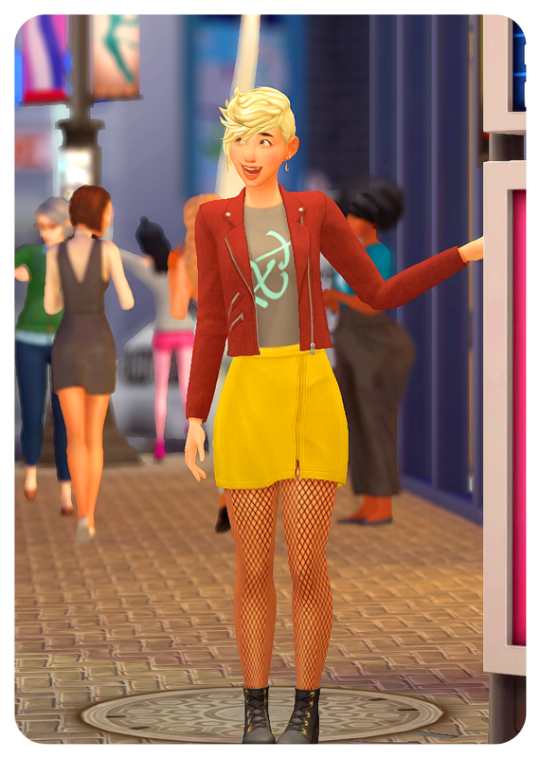

Kana Nakamura - 中邑 佳奈
Entry for @cillaben‘s Bachelor Challenge .
Age: 27
Blood type: O
Aspiration: Computer Whiz
Traits: Vegetarian, Music Lover, Ambitious
Career: Start-up entrepreneur
Kana ( 佳奈) means Powerful and those who know Kana could not find a better word to describe her. Kana graduated in Computer Science top of her class when she was just 21. Since then she has started her own start-up company which the experts are calling The Next Big Thing.
When she is not working she enjoys yoga, boxing, kicking the training dummy and most of all: music (she loves classical music and would love to learn how to play the piano one day).
Kana is definitely not a traditional girl and up until very recently finding love has not even been in her to do list. Don’t get me wrong, she has had a few boyfriends and about as many girlfriends in the past few years, but all became “obsolete” in a few weeks and Kana moved on to the next model. Will it be different with Haruto?
[Private Download if chosen]
106 notes
·
View notes
Note
Isn’t it pronounced ya-wi not ya-oo-ee?
Not exactly, In the Japanese language they pronounce words per syllables and don’t change the pronounciation of vowels according to the other letters.
There is a “ya” sound in the japanese alphabet but there isn’t a “wi” sound. (well there is but its usage is almost obsolete.)
The word Yaoi is made out of the kana “Ya” “o” and “i” which is pronounced “yah”, “oo”, “ee”
If you read it fast enough it can sound like “Ya-oy” or “Ya-wi”. Which I am guessing is where people get the mispronunciation from.
It’s like the Yanny/Laurel thing back in 2018.
16 notes
·
View notes
Text
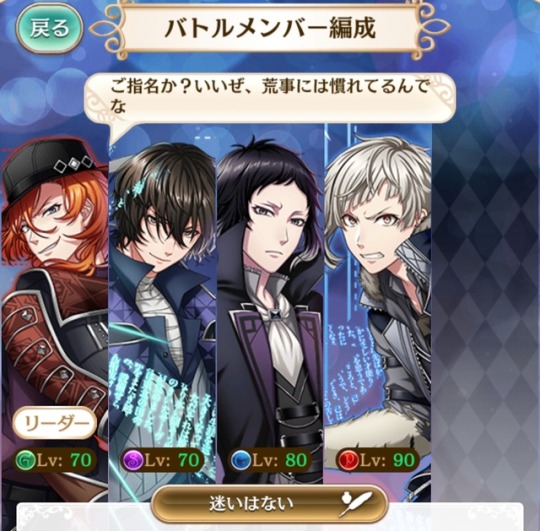
Since the event is finally done, I've renamed my team to 「迷いはない」(mayoi wa nai)
...because they're no longer lost ( ̄▽ ̄;)
Fun fact which is under the cut\( ̄▽ ̄)/
Before I get into it, I want to explain the what is katakana and hiragana (so people could understand more). Collectively, hiragana and katakana are all called kana and are the syllables of the Japanese language. The biggest way to differentiate hiragana and katakana is that the latter is use spell loanwords or onomatopoeia while the former is used for spelling out already Japanese words. However, there are times when the they spell out a Japanese word in katakana and not hiragana, and this because it gives the word a “stronger tone.” (i.e. Noragami is already a Japanese words and is usually written in hiragana, however katakana was used to leave a stronger impression.)
Anyway, with that out of the way, here’s the main topic:
In the Mayoiga game and Yume100 collab, we see "Lost Dogs" (mayoi inu) written as 「迷ヰ犬」
It's not wrong, but I guess it's not right either. This is because the katakana they used (ヰ) is an obsolete character or very rarely in use. It was derived from 井 which was one of the early Japanese syllables. Its old hiragana counterpart would have been ゐ. The pronunciations of these characters would be "wi" (or rarely, “i”). Ultimately, this pronunciation had been dropped so now we have い(hiragana) and イ(katakana) (both are “i”).
It's not wrong because considering the context of BSD, it makes sense. The characters are all from the Showa period (1926-89 disregarding a few of the older characters such as Hirotsu, Fukuzawa and Mori who died before or during the early years of the era) and therefore, it would make sense to see them use dated terms.
I say it's not right because like I said, you wouldn't normally see this used in modern Japanese. In modern Japanese, it'd be 「迷い犬」 or could also be written as 「迷イ犬」if they want to put emphasis.
TLDR; Is「迷ヰ犬」correct? Yes. They just used the kana (ヰ) to give it an outdated aesthetic, otherwise it wouldn’t be written out like that.... But that’s just a theory, a weeb theory.
If you got to the point, I just want to apologize because it got unnecessarily wordy and I’m worried what I wanted to say didn’t come through properly (ノω・、) also I’m sorry for taking up space on everyone’s feed and brain with borderline useless info lmao
I don’t know if this has been said before or anything but that’s just my thoughts on it. It’s nothing special and I feel like procrastinating on sleeping ( ̄▽ ̄*)ゞ
#mod rant#bsd#bungou stray dogs#yume100#yume100xbsd#dazai osamu#bsd dazai#chuuya nakahara#bsd chuuya#akutagawa ryuunosuke#bsd akutagawa#nakajima atsushi#bsd atsushi
21 notes
·
View notes
Note
There's actually an alternate, now-archaic, kana order that does spell out a poem (in pre-1947 orthography), known as the iroha, from the first three kana いろは in the order. It spells out a poem that uses every kana once and only once (including the now-obsolete ゐ and ゑ - wi and we, but excluding ん which was not an official kana until the late 19th century - when using that order, ん was just stuck on the end)
That’s really neat, thanks for sharing! Also I had no idea that ん was added so recently, very interesting 👀
6 notes
·
View notes
Text
The kanji in DR1 & DR2 characters' names
Today's method of procrastination: going through the kanji of DR characters' names and seeing what they mean. This started with Hajime, when I realized what kanji is used for his name.
Only characters from DR1 and DR2 here. Haven't played the third game yet.
Danganronpa 1
Naegi 苗木 Makoto 誠 苗 seedling 木 tree 誠 truth, sincerity Kirigiri 霧切 Kyouko 響子 霧 fog, mist 切 cut 響 echo, sound 子 child
Togami 十神 Byakuya 白夜 十 ten 神 gods, mind, soul 白 white 夜 night Fukawa 腐川 Touko 冬子 腐 rot, decay 川 river 冬 winter 子 child Yasuhiro 安広 Taeko 多恵子 (i.e. Celeste) 安 cheap; peaceful 広 wide, broad 多 many 恵 favor, blessing, grace 子 child (No wonder she doesn't like her real surname. xD) Fujisaki 不二咲 Chihiro 千尋 不 non- 二 two 咲 blossom, bloom 千 thousand 尋 inquire, fathom, look for Yamada 山田 Hifumi 一二三 山 mountain 田 field 一二三 one two three (^^;; what a name...) Ishimaru 石丸 Kiyotaka 清多夏 石 stone 丸 round 清 pure, purify 多 many 夏 summer
Owada 大和田 Mondo 紋土 大 large 和 harmnoy 田 rice field 紋 family crest 土 soil, earth (note: Mondo does not mean butter, like I've seen people claim. On the other hand, if you combined Mondo's and his brother's names, you get DaiyaMondo = diamond.)
Kuwata 桑田 Leon 怜恩 桑 mulberry 田 field 怜 wise 恩 grace, kindness (I assumed his name would have been written with katakana, but it actually has kanji, which are normally read rei and on. That makes the upside-down Leon even harder to figure out for Japanese, I'd imagine.) Oogami 大神 Sakura さくら 大 large, big 神 gods, mind, soul and Sakura is sakura 🌸 (ooga, btw, means ogre in Japanese. Loanword from English.) Maizono 舞園 Sayaka さやか 舞 dance 園 park, garden There is no kanji for Sayaka, but the only 'sayaka' I found in the dictionary, 明か, means clear, fresh, bright Asahina 朝日奈 Aoi 葵 朝 morning 日 sun 奈 abbreviation for Nara; what? (um, as in, it means "what?"); obsolete meaning: apple tree 葵 mallow, hollyhock
Hagakure 葉隠 Yasuhiro 康比呂 葉 leaf 隠 hide, conceal > hiding in the leaves 康 ease, peace 比 compare, ratio 呂 spine, backbone
Enoshima 江ノ島 Junko 盾子 江 large river ノ (possessive) 島 island 盾 shield; escutcheon; pretext 子 child
Ikusaba 戦刃 Mukuro むくろ 戦 war 刃 blade, sword Again, a name written only in kana, but... mukuro means corpse.
Danganronpa 2
Hinata 日向 Hajime 創 日向 sunny place, in the sun 創 Now, this is an interesting name. When I first heard it, I thought it's the 'hajime' for beginning, start, but it's actually written with a different kanji that means, yes, also genesis or originate, but also things like wound or injury. Also, when I searched for this in a dictionary, it led to the page for 傷, the usual word for wound, which has other interesting meanings in this regard, like flaw, defect, weakness. Now I just want to know what Hajime's parents were thinking when they chose the kanji for their son's name. Why not just write it in kana? No wonder he's got inferiority issues, when his very name is like this. (I don't know, maybe that's a normal Japanese name and I'm reading too much into it, but still... weird connotations.)
Komaeda 狛枝 Nagito 凪斗 狛 (stone) guardian lion-dogs at Shinto shrine 枝 bough, branch, limb 凪 lull, calm (as in the weather or of the sea) 斗 Big Dipper; sake dipper Nanami 七海 Chiaki 千秋 七 seven 海 sea 千 thousand 秋 autumns (Seven seas, thousand autumns. Sounds so poetic.) Mioda 澪田 Ibuki 唯吹 澪 waterway, channel 田 field 唯 only, merely, simply 吹 blow, breathe, puff (is Ibuki's name 'Just Breathe'? xD) Tanaka 田中 Gundham 眼蛇夢 田 field 中 middle 眼 eye 蛇 snake 夢 dream (I was surprised to get kanji for his given name! And what a name it is. The pronunciation of those characters has nothing to do with Gundham. I'm not even sure how I would read it. I kind of wish he had used this name in the hope arc…) Kuzuryu 九頭龍 Fuyuhiko 冬彦 九 nine 頭 head 龍 dragon 冬 winter 彦 boy Pekoyama 辺古山 Peko ペコ 辺 area, vicinity 古 old 山 mountain Peko is written in katakana and doesn't mean anything, but pekopeko has two meanings: - starving - bowing repeatedly; kowtowing; being servile... Koizumi 小泉 Mahiru 真昼 小 small 泉 spring, fountain 真 true, reality 昼 daytime, noon Saionji 西園寺 Hiyoko 日寄子 西 west 園 park, garden 寺 temple 日 sun 寄 draw near, gather 子 child Owari 終里 Akane 赤音 終 end, finish 里 ri (old Japanese unit of distance) 赤 red 音 sound, noise; (music) note Tsumiki 罪木 Mikan 蜜柑 罪 sin, crime, fault, offense 木 tree 蜜柑 mikan, satsuma mandarin Nidai 弐大 Nekomaru 猫丸 弐 two 大 large 猫 cat 丸 round Souda 左右田 Kazuichi 和一 左 left 右 right 田 field 和 sum; harmony, peace; Japan 一 one Hanamura 花村 Teruteru 輝々 花 flower 村 village 輝 brilliant, shining 々 (repeats the previous kanji) Sonia Nevermind Well, no kanji, of course. But worth mentioning in case everyone doesn't know yet, that her kingdom's name Novoselic comes from the bassist of Nirvana, Krist Novoselic, and Nevermind is one of their albums.
ETA: I had not included Izuru here, because both the given name and the last name are written in katakana syllable writing and have no kanji, so it is hard to say what they might mean. But now I realized this applies only to Izuru/Hajime. The old guy's name had kanji.
Kamukura 神座 Izuru 出流 神座 This is normally read shinza, and it is the place in Shinto temple where the god resides. The two kanji mean god and sit. 出 exit, leave, come out, go out 流 current, flow; forfeit
#hajime hinata#gundham tanaka#yeah I'm not going to name them all here#but those two I found the most interesting#danganronpa#dr1#sdr2
62 notes
·
View notes
Text
My speaker attitudes towards dialects
(Adapted from a Reddit comment of mine.)
People who think they know a thing or two about linguistics often tend to chastise others for their prescriptivism, especially others who know a thing or two about linguistics (and I should know—I got my BA in linguistics and East Asian studies). What they tend to ignore, however, is that a key part of linguistics is sociolinguistics, and a key part of that is speakers’ attitudes.
We are speakers. We live in a society where our language is spoken, and we know when and where certain features are used, and our attitude changes accordingly. It’s as inevitable as the change in language itself. Of course, sometimes it’s blatantly classist/racist/sexist, but that’s another issue. Oftentimes it’s purely æsthetic or something related to other issues.
So what about me as a speaker?
Generally I prefer conservative dialects of just about any language, as they maintain certain distinctions that others lose (which can lead to confusion or just less intuitive spelling and murkier etymology).
So, I’ll address the phonological level first.
In English, I like dialects that don’t mix up words like these:¹
Consonants:
Unstressed syllables:
ladder–latter
winner–winter
Syllable finally:
father–farther
Elsewhere:
wine–whine
Vowels:
Before ‹r›
marry–merry–Mary
higher–hire
coyer–coir
flower–flour
horse–hoarse
irk–erk, earn–urn, fur–fir²
Before ‹l›
vial–vile
real–reel
‹u…e›, ‹ew› after coronals
through–threw
you–yew
choose–chews
loot–lute
do–dew
toon–tune
Diphthongs:
wait–weight
Wales–wails
tow–toe
Unstressed syllables:
emission–a mission–omission
Pharaoh–farrow
shivaree–shivery
Otherwise:
cot–caught
meet–meat
The whole just makes so much more sense this way, especially if you’re teaching the language to learners, because that way there’s more of a 1:1 correspondence between orthography and spelling so there’s less memorizing involved (speaking as an English tutor and enthusiastic language learner).
It also helps when there’s a certain ‘symmetry’ in the vowel system, like when both ‹a…e› and ‹o…e› are pronounced as mid-high–high diphthongs (or just long mid-high vowels), one front and the other back; in the eastern half of the US and in the UK, that’s not really the case. Also the tense ‹a› vowel being pronounced the same in all environments makes it much less confusing to teach; in most American dialects, it tends to vary based on the sounds that follow it and whether it’s in a closed or open syllable, and in Australia (and I think certain places in the US) there’s an inconsistent split into two categories among the words. Shifts like those sometimes make more such distinctions (e.g. mad–Madd, and also put–putt for most dialects), but they can be a real headache to teach.
Similarly, I prefer to keep the vowel distinction of hurry–furry, as it makes morpheme boundaries clearer. The same for keeping the first vowel of sorry in words like corridor or horror, because it makes the orthography more consistent, following a clear rule:
A vowel letter before ‹rr› in an open syllable (within morpheme boundaries) is pronounced like a normal tense vowel.
In Hebrew, I have a special appreciation for ethnolects that maintain the distinction between:
uvular and pharyngeal voiceless fricatives, e.g. כָּךְ /käχ/ ‘thus’ vs. קַח /kä/ ‘take! masc. sing.’
glottal stops and voiced pharyngeal fricatives, e.g. אֵד /ʔe̞d/ ‘vapour’ vs. עֵד /ʕe̞d/ ‘witness’
velar and uvular plosives, e.g. כָּל /ko̞l/ ‘every’ vs. קוֹל /qo̞l/ ‘voice’³
plain and pharyngealized voiceless coronal plosives, e.g. תְּבִיעָה /tvi.ˈʕä/ ‘lawsuit’ vs. טְבִיעָה /tˤvi.ˈʕä/ ‘drowning’
plain vs. pharyngealized voiceless alveolar sibilant affricate, e.g. צָאר /t͡säʁ̞/ ‘tsar’ vs. צַר /t͡sˤäʁ̞/ ‘narrow masc. sing.’⁴
simple vs. geminate consonants, e.g. גָּמָל /gä.ˈmäl/ ‘camel’ vs. גַּמָּל /gäm.ˈmäl/ ‘(literary) camel driver’
There are other distinctions that I omitted here, mostly in terms of vowel length and quality: back in the times of the Mishna, Hebrew dialects had up to 7 or 8 different vowels and as many as 3 or even 4 different vowel lengths, but in Modern Israeli Hebrew, the vowels have coalesced into a system of five vowels with no length distinctions. However, those are pretty much obsolete except in liturgical uses, and I don’t care much for liturgical use except for academic interest because I have a very, very negative view of Orthodox Judaism. I somewhat lament the loss of such distinctions to that realm, especially since the loss of those distinctions means that a lot of Hebrew morphology and phonology no longer makes any immediate, intuitive sense (at least until you learn the logic behind it—then it makes a lot more sense but it’s still very mechanical), and is now basically the bane of every highschooler’s existence.
In Japanese, I like dialects which, unlike Standard Japanese (which is based on the Tokyo dialect and serves as the basis for transliteration and standard kana orthography), maintain the traditional distinction between:
Consonants:
plain vs. labialized velar plosives (both voiced and voiceless), e.g.
家事 /kaʑi/ ‘housework’ vs. 火事 /kʷaʑi/ ‘conflagration’
both normally transcribed kaji
雅歌 /gaka/ ‘elegant song’ vs. 画家 /gʷaka/ ‘painter’
both normally transcirbed gaka
voiced sibilant affricates vs. fricatives, e.g.:
alveolo-palatal ones: 地震 /d͡ʑiɕiɴ/ ‘earthquake’ vs. 自信 /ʑiɕiɴ/ ‘confidence’
both normally transcribed jishin
alveolar ones: 数 /käzɯᵝ/ ‘number’ vs. 下図 /käd͡zɯᵝ/ ‘the illustration below’
both normally transcribed jouzu or jōzu
/o/ vs. /wo/:
折る /oɾɯ/ ‘to fold’ vs. 居る /woɾɯ/ ‘to be’
both normally transcribed as oru
Vowels:
long mid-low and mid-high rounded vowels, e.g.:
~長 /–t͡ʃɔː/ ‘head or leader of’ vs. ~庁 /–t͡ʃoː/ ‘government office of’
both normally transcribed as chou or chō, pronounced /–t͡ʃo̞ː/ in Tokyo
In addition, I also like how the Kansai dialect allows for more varied pitch accent patterns than the Tokyo dialect. Distinctions like these, along with those mentioned above, could be immensely helpful in mitigating the preposterous amount of homophones it has (especially among Sino-Japanese loanwords) which make it so, so much harder for learners to master listening comprehension (and for native speakers to understand spoken academic or technical texts), but alas. It also makes the connection between less intuitive go-on & kan-on pairs, which generally remain a mystery to anyone who hasn’t researched them in depth or has any background in Chinese.
In other languages, I naturally prefer other such distinctions, e.g.:
Spanish dialects with lleísmo and distinción
French dialects that preserve all the vowels that Parisian French no longer does, and also between mid-high and mid-low vowels
Portuguese dialects that resist as many of the plethora of mergers other dialects have as possible
Italian dialects that distinguish between mid-high and mid-low vowels; examples of minimal pairs here
The North-central dialect of Vietnamese
Korean dialects that preserve vital distinctions in terms of vowel length and quality as well as pitch accent, and also initial /l/ in loanwords
Mandarin dialects that retain retroflex consonants, rather than merge them into alveolar sibilants (like in Taiwan and southern Mandarin dialects)
Cantonese dialects that retain the difference between
Tones
high and high-falling tones, e.g. 衫 /saːm⁵⁵/ ‘shirt’ vs. 三 /saːm⁵³/ ‘three’
Consonants
plain and labialized velar plosives, e.g. 各 /kɔk̚³/ ‘every, each’ vs. 國 /kwɔk̚³/ ‘country; national’
alveolar laterals and nasals, e.g. 里 /lei̯¹³/ ‘li’ vs. 你 /nei̯¹³/ ‘you sing.’
But at the same time, I’m not above political or regional biases, e.g.:
I like Arabic dialects that maintain the wide array of consonants of Modern Standard Arabic, but I feel very connected to my city of residence Haifa, so I prefer the dialects spoken in this region.
Also, I prefer Standard Taiwanese Mandarin (think Pearl in the Taiwanese dub of Steven Universe) over PRC Mandarin partially because, well, fuck Winnie the Pooh.
On a grammatical level, I love how dialects create subtler distinctions in terms of tense and aspect or pragmatic distinctions:
For example, while African–American English exhibits a wide array of phonological mergers (e.g. fin–thin, den–then), it also exhibits far subtler distinctions of tense and aspect that ‘Standard’ English lacks: compare the short AAE been knew vs. the much longer SE have known for a long time.
Another example is the modern ‘vocal fry’ (a.k.a. creaky voice) that some American girls have started using in the past few years, which marks parenthetical information in a sentence.
This is also why I like German dialects that have a wider use of the preterite (i.e. more northern ones), as opposed to those that have merged them entirely into the present perfect (e.g. in Bavaria). It’s also why I’m somewhat miffed by the merger of the 1st. sing. fut. conjugation of Hebrew verbs into the 3rd. masc. sing. fut. one, e.g. יַסְבִּיר /jäs.ˈbiʁ̞/ ‘[he] will explain’ vs. אַסְבִּיר /ʔäs.ˈbiʁ̞/ ‘[I] will explain’.
On the other hand, being non-binary, I have a special distaste for gendered morphology. This is why I came up with this system to do away with the last bit of gendering in English, and why although I find non-native speakers crude attempts at reinventing Hebrew morphology extremely distasteful (seriously, shit like that is why I say American Jews are, first and foremost, American),⁵ I do rejoice at any erosion I see of gender distinctions in Hebrew. It’s also why I like most sign languages so much—I say ‘most’, because Japanese SL, for example, has gendered pronouns (unlike ASL or Israeli SL, for example), and why I resent the Western influence that led to gendered pronouns becoming a thing in Japanese and Chinese, and why I often think about learning Finnish properly.⁶
On a lexical level, I have a particular affinity for archaisms, or more lexically conservative languages.
In the case of English:
I like dialects that preserve Old English archaisms, words from Old English that have been displaced by Latinate cognates, holding on like the Gaulish village of Astérix and Obelix. Words like gome and blee fascinate me and I wish they were in more common use, which is why I like the idea of Anglish so much.
I also like dialects that maintain mostly obsolete ‘irregular’ forms of verbs, for example clumb as the past participle of climb, as they provide a rare insight into the development of English.
And I most certainly like dialects that still use some variation of thou, like tha in Yorkshire or thee in Lancashire.
Hebrew, on the other hand, doesn’t really have any dialectical variations per se to speak of, or any ‘archaisms’ that they preserve, as it was pretty much dormant for nearly two millennia. Back when Jesus was still around, there was some regional variation among Hebrew speakers—this can be seen in the New Testament, for example, when people confront Simon Peter after Jesus is arrested and claim that his accent gives away the fact that he was one of Jesus’ men. For example, different accents of the time had notably different vowel systems, for example, which is why there were three different systems (roughly speaking) to indicate them at the time, and this is before we’ve even considered Samaritan Hebrew, which is about as comprehensible to a Modern Hebrew speaker as Doric (or even Frisian) is to an English speaker. Hebrew speakers borrow phrases extensively from their traditional literature, much like Chinese people with their four-character idioms, and often use more literary language in tongue-in-cheek, so it’s not really comparable. However, there is some amount of sociolinguistic variation as to doing so, but I would say it has more to do with religious and socio-economic status than ethnolect and certainly regional variation (which is far more limited in Hebrew than in English, mostly confined to rather small subsets of regionalisms), and I do like it when people do use these.
This is why I appreciate Québec French, for all its overzealously purist and prescriptivist faults. It’s often a wonderful museum of words of bygone days, from dialects that the efforts to standardize French have nearly if not completely exterminated. As an English speaker in particular, it’s interesting to see Norman remnants in the language.
On the other hand, it always fascinates me when languages borrow words for concepts they already have, and use the loanword for a more specific concept therein. Consider, for example, the English words kingly (Germanic), royal (Norman), and regal (Latin), or these fascinating examples.
The problem is that many of these features are fairly stigmatized.
In terms of phonology, I make a conscious effort to maintain most of the distinctions above when I speak English, but on the other hand I flap my ‹t›s and ‹d›s in rapid speech to avoid sounding like a stuck-up prick. Similarly, I don’t maintain the wine–whine distinction, for example, unless, say, I’m working with a student on a story that takes place in the Southern US, because I would sound like a dick who’s trying to sound like a Southern gentleman or something. I still teach the distinction, if only to explain why there is such a difference in the orthography to begin with even if I tell students not to observe it when actually speaking. When I speak Hebrew, I most certainly don’t make those traditional ethnolect distinctions—that would come across as being either unbelievably pedantic or outright mocking. When I speak Japanese or other languages, well, I generally don’t know them well enough to maintain all the distinctions as I would like to, even those that aren’t stigmatized, but I do make an effort to at least observe those distinctions when the orthography makes them clear enough (and stick to the standard in Japanese).
In terms of grammar, I don’t teach dialectical English irregular forms. At most, I gloss over them with a sentence or two, and leave it at that. I assume my average student would hardly read books or watch films or TV shows that take place in Appalachia or what-have-you, certainly not without subtitles anyway. If I ever got a particularly advanced student, however… I would still be reluctant, as I am hardly over-familiar with those dialects myself, and don’t want to mislead them. In Hebrew, on the other hand, my grammar and spelling do tend to be very conservative to the point of anachronism sometimes (like, I generally follow the BuMP rule when I speak; most Israelis don’t), but I balance it out with a decent amount of slang.
In terms of lexical items, I pretty much avoid teaching dialectical archaisms altogether. Those are almost entirely useless for students, and I don’t even speak the dialects that use them, so I can’t say for a fact which dialecticalisms are even in current use. In Hebrew, I might make some detours, but that’s because truly archaic words, that wouldn’t even be used in tongue-in-cheek, are a rarity, and oftentimes they share roots with more common words, so they can cement the understanding of those roots more readily.
If no socio-linguistic considerations (or my own fluency) were a complete non-issue?
In English:
I’d make an effort to maintain all of the distinctions mentioned above, including those that are observed today only by a handful of older people from rural areas.
I’d pronounce ‹gh› in words like right and weight to tell them apart from rite and wait.
I’d use thou and AAE grammar and any dialectical archaism or even Anglish coinage I could get away with.
And, of course, I’d use my gender-neutral pronoun system for everyone except trans people who might get dysphoric.
In Hebrew:
I’d speak Hebrew with extremely conservative pronunciation, like BCE-level ancient, making all of the distinctions mentioned above.
On top of those, I would distinguish between the voiceless alveolar sibilant and lateral fricatives (which was lost very early on), so I pronounce סוֹרֵר /soː.ˈreːr/ ‘unruly, recalcitrant’ and שׂוֹרֵר /ɬoː.ˈreːr/ ‘existing, prevailing’ (both in masc. sing.) differently (rather than pronounce both like the first).
I’d reintroduce syllable-final glottal stops so that the orthography and grammar finally make a lick of sense.
On the other hand, I would think of a system to do away with gendered language in Hebrew that still made internal sense.
In Japanese:
I’d speak Japanese with all of the distinctions mentioned above, the fact that they characterize two parts of Japan that are practically on oppsite ends of the country be damned.
I might maybe even bring back a few obsolete features, like nasal vowels or the syllable ye and palatalized consonants before e (when applicable), because they make go-on and kan-on relationships clearer, and also clear up their relationship to Mandarin and other languages with extensive Sinitic vocabulary. (Although I doubt there are modern dialects that do that today, certainly not in a discriminating way, so I might give up on that.)
And, of course, I would do it all with Kansai pitch accent, or at least There are too many homophones, damnit, I gotta tell them apart SOMEHOW!
In Mandarin:
I’d speak Mandarin with Standard Taiwanese pronunciation.
Maybe I’d even use the Old National Pronunciation—what with my background in Japanese, it would save me a lot of memorizing, because I’d remember that all the characters that ended with a voiceless consonant in Japanese have the same tone in Mandarin.
Hell, I might even reintroduce the distinction between /e/, /ɔ/, and /a/.
In Cantonese:
I’d distinguish between the tones and the initial consonants, as mentioned above.
In addition, I might even bring back the distinction between alveolar and palato-alveolar sibilants that died in 1950—it’ll certainly make things easier for me, as I’ve learned some Mandarin in the past.
In Korean:
I’d speak a mix of dialects preserving all of the above distinctions and then some; I’d probably sound a lot like I were from North Korea, but in this scenario this wouldn’t matter.
In Vietnamese:
North-central dialect all the way.
In that scenario, the only thing that would stop me from talking like that would be comprehensibility. It would definitely be an issue—even today English speakers would probably be thrown off by pronouncing the ‹gh›, for one, and I’m sure my variety of Hebrew would be incomprehensible to most native speakers today.
But for now, I’ll make do with what I got, I guess.
—
Endnotes
¹ Most dialects that do mix them up generally pronounce them like the former in each pair.
² These distinction traditionally exists in Scotland; Ireland has a two-way split that works differently. On this note, I’d also count distinctions between e.g. wait and weight, but at this point it’s already Scots, not English. (Which is just another reason I love Scots so much, along with its lexical conservatism.)
³ This distinction, as well as the three that follow, are exceedingly rare.
⁴ The phranyngealized voiceless alveolar sibilant affricate was not preserved as such in any ethnolect: it either became a pharyngealized voiceless alveolar sibilant fricative (in Yemenite and Mizrahi Hebrew), or it simply lost its pharyngealization (in Sephardi and Ashkenazi Hebrew, and Modern Israeli Hebrew)—e.g. צַד /t͡sˤäd/ > /sˤäd/, /t͡säd/ ‘side’. Barring the exceedingly rare loanword, I could not think of a single minimal pair such as the one given above.
⁵ For the record: I was raised speaking English alongside Hebrew, albeit in a non-Anglophone country, and a lot of research went into my solution to ensure that it’s based on precedent rather than be a tasteless neologism.
⁶ There are other genderless languages as well, but they’re either super-niche or spoken by communities that aren’t as progressive, or both.
1 note
·
View note